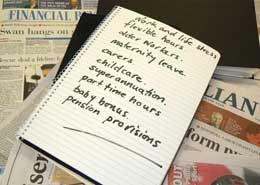30 October 2012
 As budgets tighten in pursuit of a national surplus and many family and work benefits and conditions are given close scrutiny in a bid to make savings – just which policies will deliver the best outcomes for families and the wider community can be difficult to decide.
As budgets tighten in pursuit of a national surplus and many family and work benefits and conditions are given close scrutiny in a bid to make savings – just which policies will deliver the best outcomes for families and the wider community can be difficult to decide.
Getting the recipe right to ensure that across the spectrum, from the unemployed to those reaching retirement age, people not only survive but thrive is one of the most challenging aspects of government.
Researchers from the University of South Australia’s Centre for Work + Life will be making a key contribution to policy development and evaluation on work and family issues at the Work and Family Roundtable in November.
The Work and Family Policy Roundtable co-convened by UniSA’s Professor Barbara Pocock and Associate Professor Sarah Charlesworth and the University of Sydney’s Dr Elizabeth Hill, has been funded through the Australian Academy of Social Sciences to formulate and publish a set of policy recommendations related to work and family that will inform the 2013 election.
It will bring together 30 of Australia’s leading academics and researchers from 18 institutions in the area of work and family policy.
Prof Pocock says it is clear that in times of reduced government spending there can be serious tensions between providing support for healthy and thriving communities and meeting economic targets.
“The Roundtable hopes to explore some of the issues that are most pressing for working families,” Prof Pocock says.
“What the latest Australian Work Life Index (AWALI) report shows is that in the five years we have been researching these issues little has changed to ease the stress of balancing work and life demands,” Prof Pocock says.
“Just how those stresses will play out in the community and for society as a whole in the longer term is yet to be seen, but we do know that there are strong pressure points for women working full time and that chronic time pressure is escalating in their lives.”
Assoc Prof Charlesworth says research is also showing that Australian workers are reporting an increased intensity of work.
She says stemming the tide of work-life stress will need both policy changes and a cultural rethink.
“We can legislate to introduce and improve flexibility in working arrangements, but we also need to think about how we make the cultural changes that enhance the adoption and acceptance of new policies,” Assoc Prof Charlesworth says.
And as Australia approaches a real ‘greying’ of the workforce, where people will be expected to work beyond traditional notions of the retirement age, Prof Pocock says we will need to sort out how workplaces adjust.
“If we are to maintain productive and high functioning work environments we will need to look creatively at the future of work and life in Australia and see how the interplay between economic and social outcomes is an increasingly important pivot point for productivity and healthy communities,” she says.
Prof Pocock says the Work and Family Policy Roundtable will help to prioritise, for all sides of politics, the key issues around work and family in 2013 and beyond.
The Work and Family Policy Roundtable will be held at City West campus on November 22, 2012.
More information about the Roundtable and the work of its members is available here.
Media contact: Michèle Nardelli office: 08 8302 0966 mobile: 0418 823 673 email: michele.nardelli@unisa.edu.au




